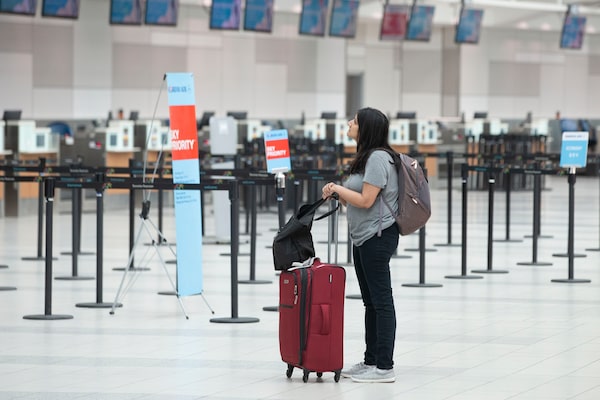
Fares are likely to rise more than they should as a result of increased industry concentration and greater focus on airline profitability.Chris Young/The Canadian Press
David Tyerman has worked as a research analyst covering transportation and industrial stocks for a number of Canada’s leading stock brokerages.
The Canadian air travel world is on the brink of major changes. Air Canada is in exclusive negotiations to acquire Transat and Onex has an agreement to privatize WestJet.
These changes significantly increase the risk that airline consumers will lose, especially budget-conscious customers. That is because fares are likely to rise more than they should as a result of increased industry concentration and greater focus on airline profitability.
One possible solution to this airfare risk is for the government to aggressively enforce anti-competition rules to support the launch of new ultra-low-cost carriers (ULCCs) in Canada, providing low-cost choices to Canadian travellers. But first let’s look at the potential problems from the pending changes in the Canadian airline world.
The proposed Air Canada-Transat tie up will significantly reduce consumer options to both sun destinations and Europe. The combined firm will control 46 per cent of the winter sun destinations market and 63 per cent of the summer transatlantic market.
Air Canada-Transat would only face two significant competitors in the sun destinations market, Sunwing-Signature and WestJet, and no competitor with more than 11 per cent of market share on the transatlantic.
The large Air Canada-Transat market share puts the combined entity in a powerful position to push for its increased profitability. Indeed, Transat has complained for years about Air Canada’s and WestJet’s ability to hurt its profitability in the sun destination market because of their large size and aggressive pricing strategies to capture market share.
The Onex deal to buy WestJet may similarly reduce options. I expect Onex to focus on maximizing returns at WestJet. This may hurt budget travellers if WestJet’s new budget traveller initiative, Swoop, doesn’t generate adequate returns relatively quickly.
Swoop has not been profitable. It is easy to imagine Onex directing WestJet to ditch Swoop to focus on the profitable WestJet brand and Encore businesses, and WestJet’s strategy to move up market and go global.
Does all of this sound like fanciful theorizing? Real world data say otherwise.
The U.S. airline experience suggests industry concentration matters a lot, shifting money from consumers’ to investors’ pockets. Four airlines control 80 per cent of the U.S. domestic market now, down from 10 in the late 1970s. As a result, North American airlines (mainly U.S. airlines) currently generate 160 per cent greater profit per passenger than the next highest profit region, Europe. This should not be surprising given the relative concentration of the U.S. airline market compared to other regions such as Europe.
Still not convinced? Warren Buffett, arguably the world’s most successful investor, is now one the biggest U.S. airline investors. Mr. Buffett’s Berkshire Hathaway owned U.S. airline stocks worth about US$9-billion in March, 2019, according to Bloomberg. Mr. Buffett was once quite sour on the sector, noting in the Berkshire Hathaway 2007 Annual Report that “if a farsighted capitalist had been present at Kitty Hawk, he would have done his successors a huge favor by shooting Orville down.”
I think Mr. Buffett’s mind was changed by the subsequent U.S. airline industry concentration, which has made it extremely profitable. Good for investors, but maybe not so much for consumers.
So Canadian travellers, already burdened with high airfares, could face further cost increases. What to do? One possibility is to encourage new competition. Canada is one of the few developed countries that does not have a ULCC.
The benefits of a strong ULCC sector are clear, as evidenced by the much lower profit per passenger in Europe than in the United States. Europe has a robust ULCC sector, while in the U.S. market, the industry concentration effect far outweighs the relatively small ULCC sector.
A number of Canadian startups, including Canada Jetlines, a firm that I am consulting for, are attempting to bring ULCC competition to Canada. Ottawa can help by enforcing competition rules aggressively.
Unsurprisingly, the Canadian incumbents are not keen on new low-cost competition. New entrant Flair (and its predecessor New Leaf) abandoned Alberta-Phoenix, Canada-Florida and California markets, citing aggressive pricing and capacity activities by the incumbents. The Canadian Competition Bureau opened an investigation into possible anticompetitive behaviour by WestJet/Swoop in December, 2018.
Rapid conclusion of the Competition Bureau work, and enforcement of any appropriate competition-enhancement rulings (e.g. restrictions on predatory pricing or capacity actions) could be instrumental in helping develop new ULCC competition to improve air traveller options.